Ranking the Woodward/Newman Collaborations
 Tuesday, August 30, 2022 at 6:47PM
Tuesday, August 30, 2022 at 6:47PM 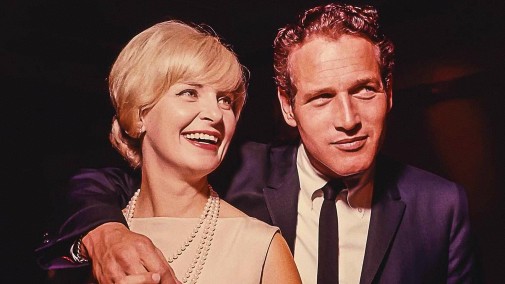
Last month, Ethan Hawke's documentary series The Last Movie Stars premiered on HBO. Chronicling the lives of Joanne Woodward and Paul Newman, the show is a precious consideration of the couples' legacy as artists, celebrities, teachers, and private people whose love endures beyond the threshold of death. Rather than being an idealized portrait, it's a program that acknowledges its subjects' thorny complexities, emerging as a humanistic jewel that's essential viewing whether or not you're a fan of its starry duo. Inspired by The Last Movie Stars, I spent a good part of August exploring many of the movies mentioned in the doc.
Specifically, I watched every single project Woodward and Newman made together, including those where one was working behind the camera. Here's a personal ranking of those 17 titles…
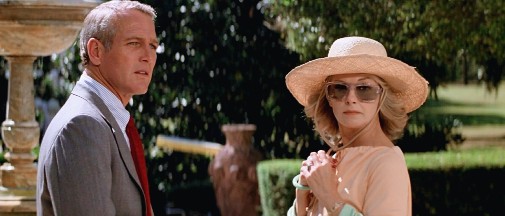
17. THE DROWNING POOL (1975) Stuart Rosenberg
Conceived as a loose sequel to Harper, The Drowning Pool marks the second time Paul Newman portrayed the LA-based PI who'd already triumphed on the big screen in 1966. This new adventure is less inspired, moving the action from California to Louisiana, where the detective answers the call of an old flame and becomes embroiled in a treacherous mystery. More than its predecessor, the movie indulges in the material's pulpy potential, verging on exploitation when it's not careening headfirst into the murky waters of silver screen misogyny. Thankfully, there's plenty to appreciate in the picture's individual elements, even as the whole thing flotsams.
Newman's performance exemplifies the man's effortless coolness, while Gordon Willis delivers a masterclass in noir-adjacent color cinematography. Glorious to behold but no less seedy because of it, Rosenberg's sequel dazzles and disappoints.
You can rent The Drowning Pool on various platforms.
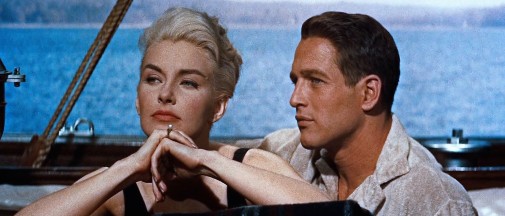
16. FROM THE TERRACE (1960) Mark Robson
First things first: What a waste of Myrna Loy this thing is! Playing Newman's alcoholic mother, the erstwhile Nora Charles is a beautiful ruin, exploding with histrionic pyrotechnics whenever Mark Robson points the camera in her direction. Thankfully, she's only in the narrative's first act, exiting the scene around the half-hour mark.
And yet, despite her discombobulated performance, while Loy is on screen, From the Terrace registers a pulse. Unfortunately, the same can't be said for the remainder of this marital melodrama, wherein Newman is an ambitious executive tied to a loveless union hoping to make it on Wall Street. Woodward is his cold bitch of a wife, meaning the couple's real-life chemistry is subsumed, transformed into feverous resentment that grows gangrenous as the story unfolds. At least, she seems to be having fun with the perfidious part, embodying a type of glamorous cruelty she rarely got to present.
Later in life, Woodward said she thought fondly of the film, partly because she looked like Lana Turner. Considering her platinum styling, Travilla's lush costuming, and Leo Tover's luxurious lensing, she's not far off the mark. Enrobed in silky shadows, From the Terrace is pretty but untouchable.
You can rent From the Terrace on various platforms.
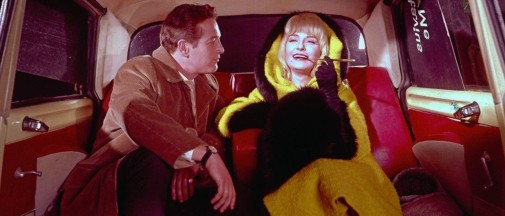
15. A NEW KIND OF LOVE (1963) Melville Shavelson
From the Terrace wasn't the only project to which Woodward gravitated in hopes of experiencing some of that old-school glamour. One of The Last Movie Stars' funniest anecdotes concerns another production that caught the actress's eye for these reasons.
While Newman initially rejected the script for A New Kind of Love, citing its retrograde gender politics and latent sexism, Woodward wanted a chance to be styled like a star, to get a Parisian misadventure with a makeover included. Confronting her husband about this, he quickly changed his mind, and the pair starred in A New Kind of Love. In many ways, they were both right. Shavelson's comedy was cringe-inducing in 1963 and is more so now, dabbing in pernicious stereotypes as it aims for sexual farce. Still, in the role of a tomboy designer mistaken for a high-class prostitute by a chauvinistic columnist, Woodward is a vision of 1960s excess. Edith Head deserved that Best Costume Design Oscar nomination for the makeover montage alone.
You can rent A New Kind of Love on various platforms.
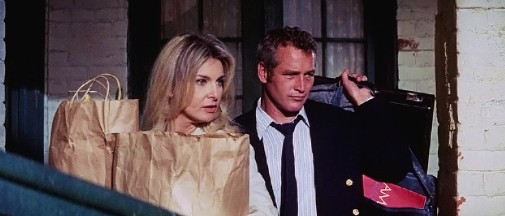
14. WUSA (1970) Stuart Rosenberg
From a frothy lark to a heavy-handed political thriller, WUSA was a project most of its creators grew to regret. Accusations of sanctimonious stridency were quickly thrown its way, as were reviews that characterized the thing as liberal exhibitionism of the worst sort. Reconsidering the movie in 2022, some of its facets feel quaint despite the contemporaneous hysteria, and others ring like prophecies about a dark future – now our present.
Newman stars as Rheinhardt, a cynical drifter who believes in nothing but has charisma to spare. One day, he gets a job as an announcer for a right-wing radio station in New Orleans, unwittingly becoming part of a sinister white supremacist scheme. Woodward is Geraldine, a facially-scarred woman who comes to challenge Rheinhardt's apathy and pays a heavy price for her naivete. Both over and under-written, these roles are like traps that hinder the movie stars. Newman is thwarted, but Woodward still emerges with an admirable performance.
That said, WUSA's MVP is neither of its top-billed players, but Anthony Perkins in a supporting role that walks the line between self-delusion and idealistic fanaticism. As Rheinhardt’s suspicious neighbor, he's the film's most contradictory figure, a fascinating variation on themes ripped from the headlines mixed with a healthy dose of Manchurian Candidate themes. Often regarded as a catastrophic failure, WUSA remains an essential point in the ascendancy of paranoia thrillers during the 1970s, primarily due to Perkins' storyline.
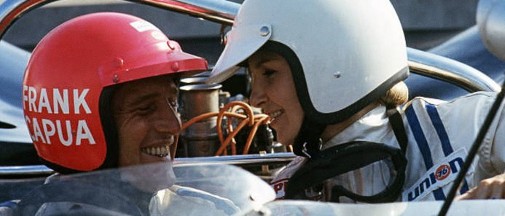
13. WINNING (1969) James Goldstone
Watching The Last Movie Stars forces a viewer to reconsider pictures that might have been otherwise dismissed. Winning is a prime example, appearing, at first glance, to be a non-descript character study about a racecar driver, his marital troubles, and the perilous intersection of the personal and the professional.
However, with added context, James Goldstone's drama emerges as a melancholic reflection of what was happening in its stars' shared lives. It's not a perfect analogy, though one can find plenty of connections between Newman and his character, his relationship with cars, his wife, and his stepson. That last factor proves to be especially crucial to the film's impact, resulting in a fractured link that throbs, an ineffable ache emanating from the screen whenever Newman shares it with young Richard Thomas, a father figure desperately trying to connect to his ward. The ghost of Scott Newman thus looms over this title in his father's filmography. It wouldn't be the last time.
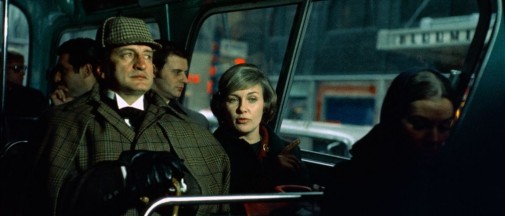
12. THEY MIGHT BE GIANTS (1971) Anthony Harvey
This strange picture counts Paul Newman among its producers and stars Joanne Woodward as a psychiatrist called Dr. Watson. Primarily because of her name, she is recruited into a Manhattan misadventure by a patient who believes himself to be Sherlock Holmes. George C. Scott, fresh from winning an Oscar for Patton, plays the madman whose madness becomes a barometer of reality as the story unfolds. The romantic aspect of the leads' dynamic never works, but both actors commit to the project with enough enthusiasm to force the script into functioning. If nothing else, They Might Be Giants unravels a study in belief, faith, how one's sense of self can dictate how the world works around them, and lunacy is in the eye of the beholder.
Still, the best reason to watch this play adaptation isn't the premise or even the stars. Instead, Victor J. Kemper's handsome lensing is the picture's most winning facet, negotiating the plot's fanciful stride with the realism of location shooting.
You can rent They Might Be Giants on various platforms.
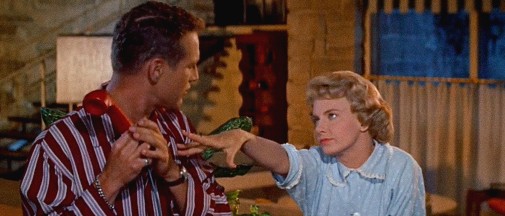
11. RALLY 'ROUND THE FLAG, BOYS! (1958) Leo McCarey
This late McCarey comedy fits nicely into the midcentury tradition of films ripen with nuclear anxiety. However, unlike other Cold War productions, Rally 'Round the Flag, Boys! substitutes gloominess for mirth.
So much so that even the potentially sexist premise gets defanged, twisted into wholesome fun. The setting is Putman's Landing, where the American army plans to install a missile base. Such developments throw the community into disarray, including Grace Bannerman, played by Joanne Woodward. She's a woman with a purpose, taking on as many civic duties as she can find in the Connecticut suburbs. But, sadly, she's not the story's protagonist – her husband is. Played by Paul Newman, Harry Bannerman is a long-suffering spouse whose marital devotion never wavers, not even when Joan Collins' Angela stands before him with a risky proposition.
Though many of their future projects would mess with the Woodward/Newman chemistry, this movie avoids that mistake, indulging in their easy rapport, Paul's wife-guy vibes, and Joanne's sense of willful independence. Rally 'Round the Flag, Boys! isn't exceptionally complex, but thanks to the stars at its center, it passes muster as a gleeful big-screen distraction.
You can rent Rally 'Round the Flag, Boys! on various platforms.
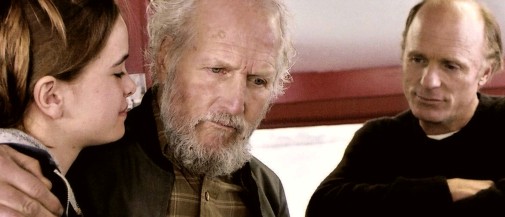
10. EMPIRE FALLS (2005) Fred Schepisi
The first TV production in this ranking signals the end of Paul Newman and Joanne Woodward's career as two of Hollywood's last true movie stars. Though they'd both bless some future projects with their voice, neither husband nor wife would ever again step in front of cameras. For their troubles, the two actors earned critical praise and golden accolades. After standing by Woodward's side as she became one of the TV Academy's favorite artists, Newman finally won an Emmy on his fourth and last try. For her part, the actress celebrated her final Emmy nomination after winning the statuette three times before. Tragically, they never share a single scene in Empire Falls.
The show is an adaptation of Richard Russo's homonymous novel about the slow decay of a small New England town. Beyond Newman and Woodward in supporting roles, the cast includes Ed Harris, Helen Hunt, Robin Wright, Philip Seymour Hoffman, Aidan Quinn, and Estelle Parsons, among many others. They all deliver quality performances, elevating the story's relative banalities to a moving drama.
Empire Falls is streaming on HBO and Spectrum On Demand.
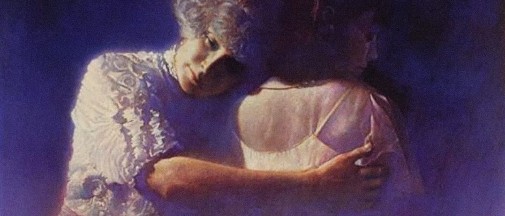
9. THE GLASS MENAGERIE (1987) Paul Newman
After her movie prospects dwindled, Joanne Woodward redirected her attention to the small screen and the stage. In 1986, she played Amanda Wingfield in a critically acclaimed production of Tennessee Williams' The Glass Menagerie at the Williamstown Theatre Festival and then at the Long Wharf Theatre. Recycling much of that staging and cast, Paul Newman shot his version of The Glass Menagerie in 1987, transporting the play to the big screen for the second time. The first movie adaptation dates back to 1950 and features many changes to the original text. In comparison, Newman's film is a faithful adaptation that captures the play's essence without many flourishes.
The result is a production built around the actors' work, especially Woodward's bravura take on Amanda and Karen Allen's Oscar-worthy turn as Laura Wingfield. Such brilliant characterizations make the film worthwhile, but Paul Newman's last stint in the director's chair is far from his best work. We'll get to that in a bit.
The Glass Menagerie is streaming on Hoopla, Kanopy, Pluto TV, and FILMRISE.
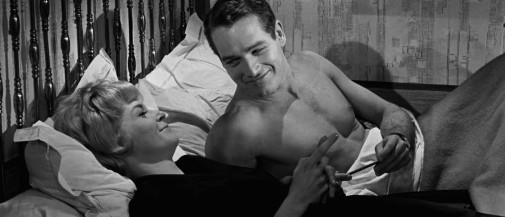
8. PARIS BLUES (1961) Martin Ritt
Although Paul Newman and Joanne Woodward have great carnal chemistry throughout the many bedroom interludes in Paris Blues, there could have been a version of Martin Ritt's picture where each star was paired with another. Instead, one might find themselves before a movie where Woodward saw herself with Sidney Poitier and Newman with a resplendent Diahann Carroll. A couple of scenes hinging on these actor combinations suggest that the alternative version would have been a success. Sadly, despite the original novel focusing on interracial romance, United Artists wouldn't have it.
The studio decision incurred the cast and crew's wrath, with both Newman and Poitier expressing vocal disappointment with Paris Blues years after its original release. Still, the compromised movie is not without its charms. Martin Ritt and company have style to spare, coursing an electrical current through every cut and composition. Duke Ellington's original score is justly famous, while André Luguet steals the spotlight from the sidelines.
Paris Blues is streaming on Hoopla, Tubi, and Pluto TV.
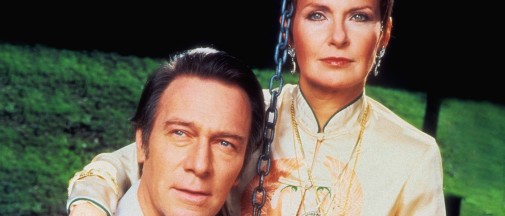
7. THE SHADOW BOX (1980) Paul Newman
Michael Cristofer's The Shadow Box made its Broadway debut in 1977 and went on to win both the Tony for Best Play and the Pulitzer Prize for Drama later that year. By 1980, Paul Newman had acquired the rights to the text and shot a TV movie adaptation of the same, recasting the play with screen actors ready to deliver some of their career's best work.
It revolves around three terminal cancer patients reflecting on their imminent demise while staying in cottages within their hospital's grounds. The action encompasses 24 tumultuous hours in these lives cut short, each of the central figure's interiority further explored through the mechanism of filmed interviews. Newman's appeal to documentary aesthetics cuts through the piece's potential for maudlin melodrama. Indeed, the director's efforts seem focused on an escape from sentimentalism, defining the film as a study on mortality rather than a cheap tear-jerker. Apart from an intrusive score, this approach is a triumph, drawing stunning performances from the entire cast.
Christopher Plummer and Joanne Woodward play a gay man and his trusted friend, the shadow of bodily decay darkening every forceful joy. James Broderick and Valerie Harper play a rhapsody of stubborn denial, while Sylvia Sidney and Melinda Dillon as mother and daughter deliver the kind of work that should define a career. Sidney, in particular, was never better than she was here, musing on a lifetime of resentments while her character's mind slips away like smoke from a grasping hand.
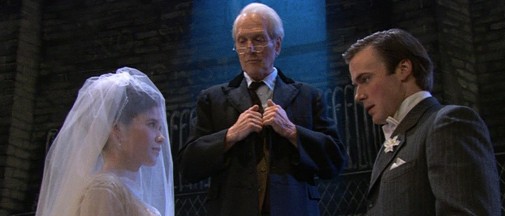
6. OUR TOWN (2003) James Naughton
This production of Our Town finds Joanne Woodward as a producer and Paul Newman in the cast, playing the Stage Manager. Truth be told, this TV movie is a filmed play, recorded at the Booth Theater during the Broadway tenure of a staging that originated at the Westport Country Playhouse. For his efforts, Newman received worthy nominations for the Tony and the Emmy.
The actor delivers what might well be the definitive take on this oft-performed role, finding the perfect balance between a theatrical device and characterization. Furthermore, this film of Our Town is an excellent argument for the play's merits in ways the Oscar-nominated 1940 movie couldn't dream of being. Naughton's filming underlines the staging's minimalism, scratching away at the nostalgia until all left is raw melancholy, a sense of abstracted impermanence that feels both specific and cosmic in scope. As someone who's never been especially enamored with Thornton Wilder's seminal work, Our Town 2003 was something of a revelation, riding a wave of anti-sentimentality towards tremendous pathos.
Our Town is streaming on Kanopy.
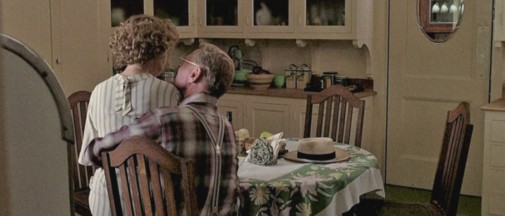
5. MR. & MRS. BRIDGE (1990) James Ivory
Watching the 2003 Showtime/PBS movie of Our Town was an exercise in reappraisal, finding new depths and angles into the material. Similarly, re-watching Mr. & Mrs. Bridge put me in the position of reconsidering past suppositions, judgments, conclusions. In other words, the film I once held as one of Merchant Ivory's lesser works turned out to be an underrated gem.
Maybe it's a factor of age. Perhaps it's the added context provided by The Last Movie Stars. In any case, Mr. & Mrs. Bridge now feels like an honest generational portrait, full of specificities and an appreciation for life's small moments. Adapting Evan S. Connell's twinned novels, Mrs. Bridge and Mr. Bridge, the film considers a conservative family living in Kansas City during the late 30s and early 40s. Some of the characters' behaviors and choices may seem awfully traditional, reactionary to an absurdist level, but Ivory and his cast dramatize it all with quiet dignity. Moreover, they don't look down on the titular figures or hide their shortcomings, eccentricities, or subtle cruelties.
The general effect is one of absolute frankness that captures that delicate pain of watching the world go on without you, children grow, and old ideals perish. Newman and Woodward are the movie's sturdy anchors in the leading roles. He is a vision of stoic masculinity in a Conservative American model, while she brings a dash of fragility to Mrs. Bridges. The performance won the actress her fourth and last Oscar nomination.
Mr. & Mrs. Bridge is streaming on Hoopla. You can also find the movie available to rent on Google Play, Youtube, and Amazon.
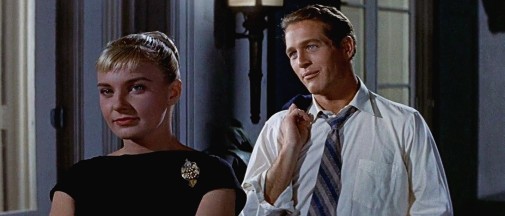
4. THE LONG, HOT SUMMER (1958) Martin Ritt
During the production of The Long, Hot Summer, Joanne Woodward married Paul Newman, and it's fair to say they brought some newlywed heat to the proceedings. The film that marked Martin Ritt's return to Hollywood's good graces after years of blacklisting pulses with carnality, weaponizing its stars' charged chemistry like no other movie in their long career. Individually or together, Newman and Woodward were never hotter – what's more, their performances match the heights of sensuality beat for beat. He went on to win the Cannes Best Actor prize and should have earned his first Oscar nomination for Ritt's film rather than Cat on a Hot Tin Roof.
Beyond those two stunning turns, The Long, Hot Summer is a vibrant piece of filmmaking in lurid Technicolor, scored to one of Alex North's most oversexed scores. Sure, some of the textual and personal behind-the-scenes tensions bleed through into the final film. Nevertheless, the overall flick is too red-hot, sweaty, and dazzling for one to care.
The Long, Hot Summer is streaming on HBO, HBO Max, The Roku Channel, DirecTV, and Flix Fling.
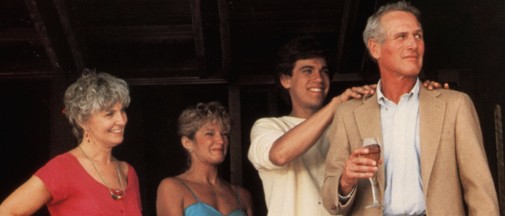
3. HARRY & SON (1984) Paul Newman
More so than Winning, Harry & Son feels like Paul Newman's on-screen reckoning with his son's sad fate. The only film the actor turned director ever wrote, this slice-of-life drama follows a widowed father and his son as they grow apart in the aftermath of the patriarch's unemployment. Guilt courses through the picture's metaphorical veins, shaping the material into a fractured critique of overbearing masculinity and its different pressures across generations. A plea for forgiveness, a declaration of responsibility, an attempt at atonement – Harry & Son is Newman's most personal project, a working-class poem with unimaginable pain reverberating through every one of its two hours, no matter how superficially laidback they might seem.
Woodward plays a minor supporting role, crucially cast as a voice of reason, a calm beacon of hope and tenderness in a world lacking both. However, her character's symbolic potential becomes more heartbreaking when considering the picture's ending. There, fates are reversed, and it's not the son who dies a premature demise but his father. What parent wouldn't want to switch places with their dearly departed child? What penitent father wouldn't long for another chance? Or, if that's not possible, for a punishment that felt just?
Harry & Son is streaming on Amazon Prime Video, Paramount+. Epix, Hoopla, Tubi, and DirecTV.
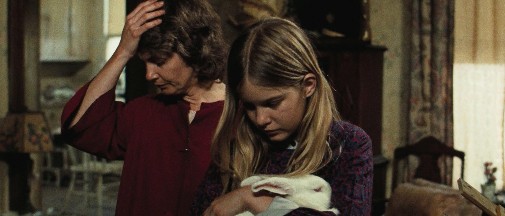
2. THE EFFECT OF GAMMA RAYS ON MAN-IN-THE-MOON MARIGOLDS (1972) Paul Newman
I have long admired Paul Newman's 1972 adaptation of Paul Zindel's most famous play and even wrote about Woodward's Cannes-winning performance before in the Almost There series. Since that write-up is already pretty extensive, I won't have much to say here. Summarily, this film is an awe-inspiring acting showcase on all fronts, ranging from Nell (Newman) Potts' naturalistic work to Woodward's scenery-chewing mania. In The Last Movie Stars, the latter elaborates on how difficult the project was to complete, forcing the thespian to explore some of the darker depths of her soul, the potential for maternal cruelty, and destructive self-involvement. That information only makes The Effect of Gamma Rays on Man-in-the-Moon Marigolds hit harder. It's devastating stuff.
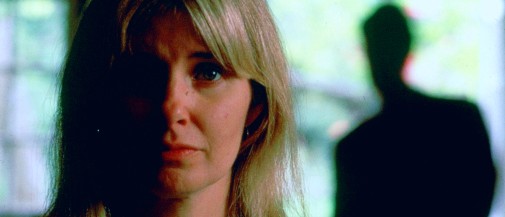
1. RACHEL, RACHEL (1968) Paul Newman
Finally, we reach the greatest of all Woodward/Newman collaborations, another instance where he stayed behind the camera directing her to a masterful performance unlike anything else in the actress' career. As a woman in her 30s suffering through a cataclysmic midlife crisis, Woodward is a miracle of interiority exposed, raw and red like a bloody wound, yet fragile and inward-looking, so internal as to be invisible. In a supporting role, Estelle Parsons is almost more revelatory, exploring the script's Sapphic possibilities with admirable abandon. Their scenes together are a neurotic delight, every glance full of unspoken meanings, every placation a confession.
In terms of form, Rachel, Rachel should be viewed as the pinnacle of Newman's ambition in the director's chair – a feat made more impressive by the fact this was his debut in that field. Despite the man's propensity for playing with the camera and how it could shape drama, his craft is always devoted to Woodward. Newman's love is evident, as is his admiration for the leading lady as an actress. That affection helps combat some of the movie's more despondent notes, resulting in a heart-wrenching song of celluloid and ravaged souls.
You can find Rachel, Rachel, available to rent on Apple iTunes, Google Play, Youtube, VUDU, and Microsoft Store.
How many of these projects have you seen? How would you rank them?



Reader Comments (6)
I love them most together in The Long, Hot Summer. Newman's better there than in Cat on a Hot Tin Roof, too. I like the overall movie more, as well. You can feel the heat in that movie in multiple ways.
Great post!
I've seen 11 of their projects together. My ranking:
11.Harry and son (I didn't like the story or the directing, just forgettable!)
10.The drowning pool
9.From the terrace
8.A new kind of love
7.Shadow box
6.The glass menagerie
5.Paris Blues
4.The long hot Summer (what a sexy couple!)
3.Effect of the gamma.. (Woodward is really amazing)
2.Mr. and Mrs Bridge (very good performances)
1.Rachel Rachel (Newman's best film as director )
I have only seen 4 of them,i'd say Newman is better than Woodward in Mr and Mrs Bridge.
I prefer Mr. and Mrs. Bridge. Of the 17 collaborations, it’s the film I’ve chosen to rewatch most frequently.
I am captivated by how Rachel, Rachel played a significant role in creating the famed tie for Best Actress in 1968.
Paul Newman typically did not campaign for Oscar recognition for his work. However, his ardent efforts to win a Best Picture nod for his directorial debut Rachel, Rachel were clearly evident. Most saw the small actor-driven film struggling for that fifth slot with the highly regarded science fiction extravaganza 2001: A Space Odyssey.
On the morning of the nominations, Newman and Woodward were front runners for Best Director and Best Actress. Both had won respective NY Film Critics and Golden Globe prizes. When nominations were announced, Newman’s efforts proved victorious. Rachel, Rachel was a nominee for Best Picture. However, the Directors branch had snubbed Newman in favor of Stanley Kubrick for 2001.
Best Actress nominee Woodward was apoplectic. In a widely published story, “It’s a total boycott,” Woodward ranted. “This negates the whole purpose of the Academy. I’m not going to go.”
Though Newman was able to calm his wife to recant her refusal to attend the upcoming ceremony, the damage was done, Woodward lost her front runner status and the race was now seen as a free-for-all. Mrs. Newman’s heated public response played a role in Katharine Hepburn and Barbra Streisand sharing the Best Actress Oscar.
I continue to marvel ar your stamina / commitment at watching and writing about so many movies. This would surely take me an entire year!
I love Mr. & Mrs. Bridge. For the longest time, I couldn't understand why it was considered minor Merchant Ivory.